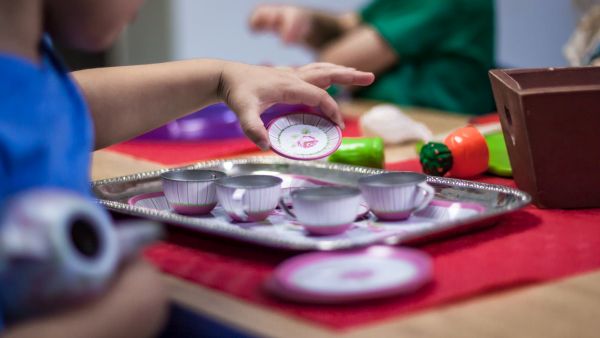
A curious mind is an active mind, a healthy mind, a vibrant mind. All children are born curious, for they spend their days observing and exploring the world around them. Babies want to know how things work, smell, taste, and feel. Toddlers expand their reach as they become mobile, and older children expand their knowledge as they enter school. A strong sense of curiosity is the key to intellectual independence and a lifetime of learning.
Check out these six parenting strategies to help nurture a sense of curiosity.
Mix It Up
Novelty and surprise are great igniters of curiosity. Occasionally switching up traditions will delight your child and encourage him to step back and look at the world with a new and wider sensibility. Have breakfast cereal for dinner once in a while. Announce a “backwards hour” when everything you say to each other means the opposite. Mix up the familiar lines of a story to make a silly, nonsensical one. Encourage him to do the same.
Mess It Up
A toddler doesn’t learn to use a spoon instantly. Practicing leaves lots of food on her face, in her hair, and spread thinly over the table of her high chair. Exploration is part of the learning process and it never happens without mistakes. Even neatniks must learn to take the mess in stride or risk rising blood pressure.
If your living space is small or you just can’t bear constant chaos, consider dedicating one area in your home where your child can explore freely and safely. Strict boundaries aside, a child will know that he’s got some space to learn, question, and grow.
Make Mistakes
A toddler will stumble and fall multiple times before he masters walking. Those trips and falls are part of the process. If a child is taught that mistakes are an inevitable part of learning, then he or she will be more willing to ask questions and put effort into greater achievements than he or she may think possible.
You, as a parent, are the perfect model for this behavior. The next time your child sees you break an egg that splatters to the floor, shrug, laugh, clean it up, and try again.
Question Everything
Be an example of healthy, vibrant curiosity. Ask intriguing, age-appropriate questions, and then seek answers as a team. Why does homemade bread rise? How is paper made from trees? Where do squirrels sleep at night? Chances are your child will discover he has lots of questions of his own.
Slim Down The Schedule
It’s a mad, mad world out there. Many parents, worried about their children’s prospects, start strategizing from the preschool age how to best fashion a candidate for the Ivy League. Athletics, music lessons, community service, and tutors can soon fill a child’s day from dawn to well past dusk. Yet admissions officers at Ivy League schools say that when it comes to the qualities of likely candidates, independent intellectual curiosity is key.
Every child needs time and freedom to explore his or her own interests. Boredom is a catalyst to personal intellectual curiosity.
Light The Path
Your child will likely go through phases where he’s passionate about one thing or another. Perhaps it starts with bugs, then moves to trucks, and then matures to stamp or coin collecting. On his own, he can only learn so much. In all these cases, a trip to the non-fiction section of the library can be mind-blowing. Later in life, an introduction to a (safely-firewalled) search engine will be a revelation.
In the end, guidance, rather than teaching, is the key to encouraging curiosity.





















